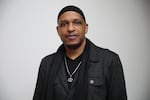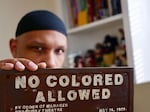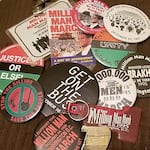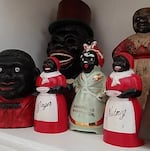Segregation-era drinking fountain signs and Ku Klux Klan hoods sit alongside Public Enemy vinyl records and buttons from the Million Man March. They're just a few of the thousands of artifacts that Dr. Khalid el-Hakim has collected over the decades to teach the public about black history in America.
His Black History 101 Mobile Museum was in Portland last week. el-Hakim, who founded the museum more than 20 years ago, visited each of the Portland Community College campus locations to display the most recent exhibit.

Dr. Khalid el-Hakim started the Black History 101 Mobile Museum in Detroit more than 20 years ago.
Lauren Kristensen / OPB
The museum's permanent collection is housed in Detroit and includes more than 7,000 artifacts. The collection spans centuries, with items ranging in origin from the trans-Atlantic slave trade to the civil rights era and the Black Lives Matter movement.
Each year, el-Hakim assembles about 200 objects for a themed exhibition and takes it on the road.
“It's almost like a curated piece of artwork” he told Dave Miller in an interview on OPB’s “Think Out Loud.”
El-Hakim’s exhibits purposely avoid description panels because he wants Mobile Museum visitors to identify names, events, or objects that are unfamiliar to them and then do their own research.

Dr. Khalid el-Hakim holds a cast iron "No Colored Allowed" theater sign from 1925.
Courtesy of Black History 101 Mobile Museum
El-Hakim started collecting memorabilia in his early teens. Hip-hop culture was one of his first entry points into Black History. Growing up in the mid-eighties, he noticed that groups like Public Enemy introduced key African American names and events into their music to help raise the consciousness of their fan base.
In the early nineties, el-Hakim took a sociology class taught by Professor David Pilgrim at Ferris State University. At that time, Pilgrim was using artifacts to teach students about the history of racism in America.
That class showed el-Hakim that objects can teach powerful lessons about history.
“Objects carry energy with them,” he said. “It’s one thing to see a segregation sign … in a documentary or in a textbook. But it’s a whole different experience to feel …the actual weight of it and see it in person.”
El-Hakim later became a social studies teacher in Detroit. There, he began using the African American artifacts he collected to supplement black history omitted from middle school textbooks. He started filling in the gaps, including the under-representation of black political figures in the classroom, with material culture. For many African American students on the Eastside of Detroit, el-Hakim said seeing and touching these primary resources made history feel real.

Vintage Million Man March buttons and memorabilia are included in many of the museum's travelling exhibits.
Courtesy of Black History 101 Mobile Museum
El-Hakim was inspired to turn his collection into the Mobile Museum after he went to the Million Man March in 1995. He was moved by Minister Louis Farrakhan's call for men to contribute to their local communities.
So, he started going to local community meetings with the artifacts he had collected. He’d set up exhibits with Black Panther newspapers and Aunt Jemima cookie jars so people could learn about the objects and their history.
In 2011, el-Hakim left the classroom to focus on the Mobile Museum full time. For almost a decade, he has traveled the country year-round with artifacts to teach both students and the general public about African American history. As of this year, the exhibits have traveled to 40 states and visited over 500 institutions.

These figurines and Aunt Jemima spice jars are part of the Museum's permanent collection.
Courtesy of Black History 101 Mobile Museum
The Mobile Museum serves as a Black History introduction for many. 101 is a shorthand for an introductory level course, and el-Hakim still finds it a fitting name for the museum. Based on his interactions with visitors, much of the American public seems to know very little about African American history, he said.
He hopes that going to the museum will prompt people to think about the dominant narratives in American history, and the voices that have been left out of those stories.
“In society, everyone loses out when those voices are not heard,” he said, “so we have to create spaces and be intentional. We have to demand that these voices are included.”
To hear the full interview with Dr. Khalid el-Hakim, hit play on the media player at the top of the page.